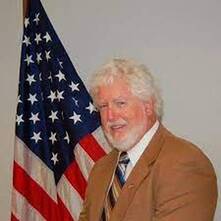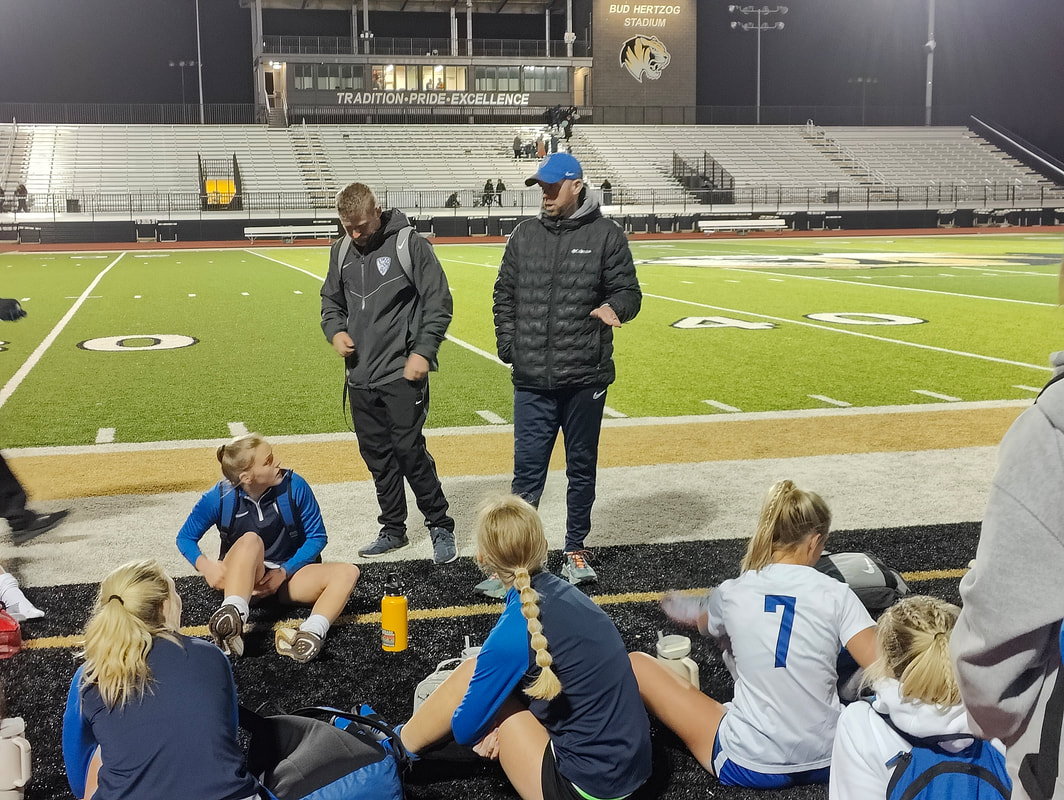|
|
Missouri Department of Transportation (MODOT) crews with the bridge replacement work along Interstate 70 at Route AA/BB in Grain Valley will close the left lane of eastbound Interstate 70 and shift lanes of traffic near mile marker 25 near Grain Valley beginning at 8 p.m. on Thursday, March 30, until approximately 6 a.m. the following morning.
This traffic change is for pavement repairs and may cause delays in the area. All work is weather permitting. This project will be constructed over the course of three phases in the next year. Phase 1 includes bridge work and work within the median, and is scheduled to be completed by early summer 2023. Phase 2 will address the westbound side of the project and Phase 3 will address the eastbound side. The project is anticipated to be complete by winter 2023. In its 46th year, Jacomo Summer Camp is inviting campers 6-11 to "take the plunge" and discover the fun of summer camp. The camp is located at the Kemper Outdoor Education Center, a 40-acre site nestled in the Fleming Park Nature Preserve on the east side of Lake Jacomo.
Campers ages 6-11 may attend one or all 10 one-week sessions of camp, offered June 5 through August 11, 9:00 a.m. to 3:45 p.m., Monday through Friday. Extended hours are also available. Weekly activities include swimming, kayaking, fishing, archery, hiking, nature study, arts and crafts, a visit to one of Jackson County’s beautiful beaches, and weekly themed field trips. The cost for regular hours is $185/week; extended hours are $220/week. Online registration begins at 12:00am on April 3rd. To register, visit www.makeyourdayhere.com/daycamp The following information is derived from Grain Valley Police Department daily calls service log for the week of March 22-28, 2023.
March 22, 2023 I-70/ Main St Area check 500 Blk Centurion Ct Disturbance PHQ Citizen contact 700 Blk Squire Ct Commercial alarm 1200 Blk NW Long Citizen contact PHQ Citizen contact BB/Sni-A-Bar Area check March 23, 2023 600 Blk SW Nelson Dr Residence check 1200 Blk NW Phelps Suspicious vehicle 200 Blk NE Cypress St Suspicious vehicle Sonic Drive-in Disturbance QT Citizen contact 1300 Blk Eagles Citizen contact 700 Blk NW Par Residence check PHQ Warrant service 700 Blk NW Albatross Citizen contact 100 Blk Main St Citizen contact 300 Blk W Front Agency assist 1000 Blk W Ryan Rd Extra patrol March 24, 2023 PHQ Citizen contact 1000 Blk N Buckner-Tarsney Citizen contact 500 Blk W Ryan Rd Ex-Parte violation 1100 Blk N Buckner-Tarsney Welfare check 600 Blk NW Yennie Ave Agency assist 40/N Main St Motor vehicle accident 1100 Blk N Buckner-Tarsney Armed disturbance 300 Blk SW Creek Ridge Dr Missing juvenile RD Mize Rd/City limits Agency assist 1000 Blk Stoney Point Abandoned auto 800 Blk SW Country Hill Dr Suspicious vehicle 1000 Blk SW Sandy Ln Parking complaint 200 Blk Main St Motor vehicle accident 3000 Blk SW Eagles Pkwy Agency assist 40/700 Blk Main Motor vehicle accident McDonald's Motor vehicle accident March 25, 2023 WB 70 Area check 800 Blk NE San Karr Verbal disturbance 700 Blk SW Cross Creek Residence check 600 Blk SW Gateway Ct Suspicious vehicle 2300 Blk NW Lindenwood Ct Welfare check 600 Blk Broadway St Animal call 400 Blk SW Rock Creek Dr Disturbance March 26, 2023 200 Blk W Front St Missing person 400 Blk NE Wolf Creek Rd Stealing 200 Blk NW Parker Dr Trespassing 1000 Blk SW Sandy Disturbance 900 Blk SW Stone Brook Property damage 300 Blk W Front St Agency assist 700 Blk Main St Disturbance 1300 Blk NW Sycamore Runnaway juvenile PHQ Citizen contact March 27, 2023 Buckner-Tarsney / E Duncan Rd Motor vehicle accident PHQ Citizen contact 900 Blk NE Deer Creek Rd Stealing NE Mary Ct & NE Greystone Blvd Animal control 1300 Blk NW High View Dr Harassment March 28, 2023 1000 Blk SW Sandy Trespassing 1400 Blk Eagle Ridge Suspicious person 3 NW Valley Cir Agency assist 200 Blk W Front St Welfare check 1000 Blk SW Christie Ln Residence check 700 Blk NW Albatross Dr Residence check PHQ Public service PHQ Citizen contact PHQ Citizen contact 1000 SW Sandy Ln Citizen contact Additional calls for service: Suicidal Subject: 2 Order of Protection: 1 CIT/Mental Health Welfare Check: 2 by Michael Smith After Monday’s game against Lee’s Summit, Grain Valley head coach Brett Lewis had a message for his team. “We need to have the memory of a goldfish,” he said. What he meant by that was his Eagles need to have a short memory as his team ran into some bad luck and misfortune against the Tigers in a 6-0 loss on the road. Lee’s Summit had a pair of goals that deflected off the hands of goalkeeper Alayna Maybell and went into the net. A Grain Valley freshman Taylor Nicholson also got a red card with 3 minutes, 48 seconds left in the first half, which left the Eagles (2-2) short one player for the remainder of the game. “We were down a person and still found a way to create opportunities,” Lewis said. “We never really quit. Our girls responded really, really well.” Despite that the Eagles were still able to muster seven shot attempts. Two of those from freshman Radleigh Childers bounced off a goal post and ricocheted away from the goal. Junior Emma Thiessen also had a header that bounced off the crossbar and away from the goal. “Radleigh is going to get one here soon,” Lewis said. “She hit three or four posts in the Staley Tournament. She hit two posts tonight. She has hit it a ton. She is due.” Lee’s Summit (2-0) controlled the game from start to finish and led 3-0 at halftime. Junior Adriana Benassi scored on a breakaway in which she traveled about 45 yards before dribbling the ball inside the Grain Valley penalty box and punching one in from the left side. Junior Tatum Bresette made it 2-0 in the 19th minute with a direct free kick from 35 yards out that went over the outstretched hands of a leaping Maybelll; and senior Chloe Wilmes knocked in a penalty kick inside the left post in the 36th minute. Bresette completed the hat trick with two goals in the second half, while Grain Valley was down one player and Benassi also notched another goal as eh outran the entire Eagles back line and scored on an open run deep in the 18-yard box. “She was strong and very physical,” Lewis said of Benassi. “She’s a great finisher. She got around our outside backs a couple of times. We need to have two girls on her instead of having our backs isolated on her 1 v. 1. She was a special player for them. She is very unique.” The Eagles will play against Park Hill South today at 6:30 p.m. at home. Grain Valley junior Annabelle Totta, left, tries to settle the ball to her feet. Photo credit: Michael Smith Grain Valley head coach Brett Lewis, right, talks to his team after a 6-0 loss to Lee's Summit. Photo credit: Michael Smith
by Michael Smith The Grain Valley baseball team had two opportunities to close the game out. After falling to Liberty 8-3 in Game 1 of Saturday’s doubleheader, the Eagles had a 4-3 lead in the bottom of the seventh inning and a 6-4 lead in the bottom of the tenth in the nightcap. They surrendered both leads due to miscues and errors, allowing the Blue Jays to come back to tie the score in both frames. However, they did not allow the winning run to cross in either inning and eventually ended a the marathon of a contest with a four-run 13th inning to close out a 10-7 victory at Liberty High School to split the double header. “We kept the energy up the whole game,” Grain Valley junior catcher Brody Baker said. “When we were down, we were making stupid errors. That ball in center field, Shane catches that ball 99 times out of 100. We were making simple mistakes but we kept fighting and kept the energy up.” Head coach Brian Driskell echoed similar sentiments. “It’s an outstanding job by our guys,” Driskell said. “It’s weird to say that after giving up seven runs. We learned a lot about our team tonight and I am excited to share that with them.” “We got a split against a good team. We’ll take it. It was a team win.” Liberty lead Grain Valley 3-0 going into the top of the fourth, but an RBI groundout from senior Blake Prewitt and a two-run single on a ground ball up the middle from sophomore Max Snyder, allowed the Eagles to tie the game at 3-all. Three innings later, Grain Valley took the lead when junior Brek Sloan hit a ground ball to shortstop Kayden Cook. Grain Valley senior Michael Montgomery got such a good jump from first base, that he beat Cook’s toss to second base and was called safe. Sloan was thrown out at first, but junior Shane Barnett, who was on second base to start the play, was hustling the whole time and beat first baseman Jackson Tankesley’s throw home to score and make it 4-3. Up until that point, starting pitcher Dennis Leonard, a sophomore, tossed a gem. He went six innings and allowed three earned runs on five hits, walked one and struck out 10. “Once Dennis gets rolling, he gets in a mood,” Baker said. “He doesn’t talk when he’s in the dugout.” He was in line to get the win as junior lefty Ian Kamstra came in to close the game. He struck out the first two batters he faced, but walked Addison Smith on a 3-2 count to give the Blue Jays a little bit of life. Third baseman Nathan Spengler then followed with a pop fly to shallow right field. Montgomery called off all the other fielders to let them know he had the catch, but he appeared to lose the ball in the lights and it dropped for an RBI triple to allow Liberty to tie it. Kamstra struck out Dane Moberly to send the same into extra innings. After leaving the bases loaded in the eighth and going down 1-2-3 in the ninth, the Eagles had runners at second and third base with two outs against relief pitcher Tanner Warner. Barnett hit a soft ground ball to second baseman Christian Kutcha. His throw to first was low and was dropped by Tankesley, that allowed both Kamstra and Snyder to score to put the Eagles ahead 6-4. But just as Grain Valley appeared to have the same in hand, an error caused the same to extend. With Kamstra still pitching, Tankesley hit a sacrifice fly to score Chase Litrell from third base to narrow the gap to 6-5. Litrell reached earlier in the inning on a dropped fly ball to center field. With two outs Cook singled and scored all the way from first base after Jack Questschenbach hit a flare that dropped into shallow left field for a single. A throw from the outfield to third baseman Brek Sloan went side as a Liberty pinch runner broke for home. The junior got the throw to Baker on time, but the ball popped out of his glove, allowing the tying run to score, making it 6-all. With the winning run at third base, Kamstra struck out Warner to end the threat. Kamstra helped Grain Valley keep the game close as he tossed five innings and allowed two runs (one unearned) on two hits, walked four and struck out 10. “I was excited to come out to pitch and help the team win,” Kamstra said. “The energy we brought in the second game was way better than the first.” The Eagles (4-2) left the bases loaded in the 12th inning but finally broke the game open in the 13th as Baker drilled a RBI single to left field with no outs. “We probably should have sac bunted but Avery (Garmon), asked Coach to let me swing away,” Baker said. “That was my first hit of the day and it happened at a great time.” Kamstra got a ground ball to the right side to go through for a run-scoring single on the next at bat; Snyder brought home another run with a double to deep left field that got over the head of Moberly; and Barnett floated a single to shallow right field to cap a four-run inning for his team. “I felt good swinging the bat,” said Snyder, who also contributed with two sacrifice bunts and three RBIs. “It felt really nice to hit the ball.” Montgomery finally closed the game for the Eagles on the mound as he tossed two innings and just allowed one run in the bottom of the 13th. Grain Valley right fielder Trent Melton goes for a ball on a line drive. Photo credit: Michael Smith Grain Valley sophomore Max Snyder hands his batting gloves to assistant coach Austin Graham after hitting a 2-run single. Photo credit: Michael Smith Grain Valley starting pitcher Dennis Leonard tossed six innings and had 10 strikeouts during a 10-7, 13-inning win over Liberty in Game 2 in a doubleheader. Photo credit: Michael Smith Grain Valley senior Michael Montgomery squares to bunt.
Photo credit: Michael Smith
Grain Valley News hosted a candidate forum featuring Board of Aldermen and Board of Education candidates on March 21, 2023 at Grain Valley South Middle School. Video from the event is provided below and on our YouTube channel.
by Michael Smith The Grain Valley boys golf team has a clear goal of making it back to the state tournament this season. Last season, the Eagles competed in the Missouri State High School Boys Golf Championships for the first time in program history. The momentum from that season appears to have carried over into 2023 as the team finished third in the season-opening Independence Invitational Monday. They followed that up by shooting 320 in a tri dual against Class 5 Blue Springs and Blue Springs South Thursday at Adams Pointe Golf Club, taking first place. Blue Springs South had a team score of 329 and Blue Springs shot 355. Junior Charles Aldred and senior Owen Herbert were both medalists, each shooting a 78 to lead the field. Seniors Mason Morris and Jaiden Owen both shot 82 to complete the scoring for the Eagles. Eli Herbert had an 83 and Jack Hileman had a 92. Both of those scores did not count toward the team score. “When you get to throw out an 83, that’s a good day,” Grain Valley golf coach Andy Herbert said. “The kids played great. We can’t rest on our laurels but keep working to make every round a little better than this.” “When (Owen Herbert and Aldred) get into a groove at the same time, this team is really good. It’s exciting and I know they are excited. They will both tell you that 78 is good but they could have done better.” Herbert, who was an all-state medalist last season, said he thought he could have played better but was happy with the outcome and the team victory. “I started off early well then I was four over on my last four, so it wasn’t my best finish,” Herbert said. “But to be able to shoot 320 as a team and 78 individually, is a really good way to start the year.” Alred had a similar path to his score of 78, he started out hot but tailed off near the end. “I was even through the first seven holes then I messed up (Hole 8) and I had a double (bogey) on the last hole,” Aldred said. I played a really good round and it was exciting to see what our team could do. We had someone who had a good score today that hasn’t played in over a year. That just shows how deep we are.” Aldred said that his putting was the key to get one of the best scores on the day. “I think I putted really well,” Aldred said. “I didn’t make a ton of puts but I set myself up for simple tap-ins that I didn’t have to stress over.” Grain Valley, which is in Class 4 this season, could build momentum off a win like this, especially against bigger programs. “Blue Springs South is a pretty good program that has had success,” Aldred said. “It gives us confidence going forward.” Oak Grove Invitational On Friday, the Eagles won the Oak Grove Invitational with a team score of 313 Friday at Adams Pointe Golf Club. Aldred won medalist honors and tied a school record low score by shooting a 74. Owen Herbert was in second place individually with a 77, Eli Hbert shot a 79, Jaiden Wilson had a 83 and Mason Morris shot an 89. Grain Valley junior Charles Aldred, left, and Owen Herbert both shot a 78 to earn medalist honors as they contributed to a team score of 320 that was good for first place in a tri dual against Blue Springs and Blue Springs South Thursday at Adam's Point Golf Club. Photo credit: Michael Smith
Update: Jan Reding's responses have been added to the article. 3/24/2023 Seven candidates are on the ballot for Grain Valley's school board. Voters will select three members from the slate of seven candidates. Each candidate was invited to respond to the following series of questions from Valley News. Two incumbent candidates - Jeff Coleman, Tisha Homfeld - have not provided responses. Responses received after the deadline will be published and any updates will be noted at the top of this article. Candidates are listed in alphabetical order, and other than minor spelling or grammatical corrections, the candidate's responses are provided as written. Michael Hackett Is there a particular issue that motivates you to serve on the board of education? I don’t have a particular issue that motivates me, I want to see all our children succeed. I want us to come together as community to support all of our students. What experiences or skills have prepared you to serve as a board member? I have 18 years of experience serving the community on the Grain Valley Board of Education. I have experience with how state statues impact our local schools, and a working understanding of how a Public School operates. What is the biggest challenge facing public education and how can the board best address the challenge in our community? Sufficient funding to make sure our teachers and staff are paid what they should be paid is high on the list of things that allow us to attract and keep good people. We need to be the voice to our state lawmakers to remind them of the needs of our community and their duty to see we have the support we need to prepare our students to be Missouri Citizens tomorrow. What role should the community play in supporting the education of children? There are several ways the community NEEDS to play. Parents need to engage with their students, they need to engage with the teachers who teach their children. The community needs to be involved in every opportunity the school has for engagement; PTA’s should be standing room only, and there should be wait lists to serve on Steering Committees, as well as every Stakeholder opportunity. What distinguishes you from the other candidates? I’ve been passionate about Grain Valley Schools for many, many years. I’m a graduate of Grain Valley Schools and want to see our students have far more opportunities than I did, and even that my children had coming through Grain Valley. Lance Pollard Is there a particular issue that motivates you to serve on the board of education? I believe there is a disconnect between the community and the school district. We must do a better job of being transparent with what is being taught in classes and what is being distributed to the kids in our schools. What experiences or skills have prepared you to serve as a board member? During my career, I have been given the opportunity to take on leadership positions and help move groups of people towards a common goal. I have found that communication and transparency are key components of leadership. What is the biggest challenge facing public education and how can the board best address the challenge in our community? I believe that one of the challenges currently facing the public education system is a decrease in teacher's salaries. Also, I believe parent involvement is far too low. We need to find ways to better interact with our community. What role should the community play in supporting the education of children? GET INVOLVED. Attend your school board meetings. Go to your parent/teacher conferences. Know the curriculum and content being taught in classrooms. Don't be afraid to reach out to our great teachers or administrators with your concerns or questions. Be a volunteer when needed. There are so many productive avenues that parents and community members can take to give back to our education system. What distinguishes you from the other candidates? I would bring a fresh mindset to the BOE with a common sense approach to leadership. I would always advocate for increased benefits and salaries for our hard working staff and administration. Every decision made must benefit the kids in our district. I will fight for your kids as hard as I do my own. Jan Reding Is there a particular issue that motivates you to serve on the Board of Education? It is important on any board to have seasoned members that have not only experienced the activities and transactions of the past, but have had a working participation in the short and long-term goals of that organization. I believe I have the experience and knowledge in making policy, in expanding and maintaining our district facilities, and in assuring that our district is financially sound. What experiences or skills have prepared you to serve as a board member? I feel qualified to serve on the Board, as I have been a board member for the last 24 years. I have attended over 100 hours of board professional development and received a Masters’ certification for professional development in the training sessions at the annual Missouri School Boards’ Association meetings. In addition, I had a working experience in personnel and property management during my 37 years as manager of the Kansas City Power & Light Building. What is the biggest challenge facing public education, and how can the Board best address the challenge in our community? It would seem that the biggest challenge facing public education in Grain Valley is the lack of sufficient funding to provide adequate salaries for our teachers and staff, and bonding capacity to continue to build and maintain facilities to accommodate our growing student population. Funding for our employees is below that of the surrounding school districts, and we have the best-qualified staff in the state. It is important that the public understand the reasons why we are seeking the funding we need. We are fortunate to have our monthly senior citizen luncheons. I visit with each table to answer any questions they may have concerning news they have heard or read about. In addition, our school superintendent, Dr. Brad Welle addresses the audience as to any current issues they will hear or read about concerning the school district. What role should the community play in supporting the education of children? Any member of our school community who has a question or concern is welcome to attend our board meetings or to call a member of our administrative team. We want households to understand the reasoning behind the decisions we make, and having an open line of communication eliminates misunderstandings. What distinguishes you from the other candidates? I do not think there is a distinction. I believe we are all willing to serve in a capacity that can assist in providing the best possible education for all of our Grain Valley students, while at the same time provide the adequate funding for our teachers, staff and facilities to live up to our motto of “effectively educating every student every day!” Sarah Swartz Is there a particular issue that motivates you to serve on the board of education? As a Board of Education member, I would ensure that all kids feel safe and included in our schools. Additionally, I want teachers to know they are supported through their professional decisions in the classroom. What experiences or skills have prepared you to serve as a board member? I have previously taught 6th grade and 9th - 12th grade and am currently a school counselor. Working in a school gives me a vantage point of the everyday life of an educator. I understand all the demands our teachers and students are facing. I have served on many district committees and serve on Sni A Bar's PTA. I am dedicated to this district and helping our community. Through my skill set of counseling, I am able to listen to all viewpoints and work together to come to a common goal. What is the biggest challenge facing public education and how can the board best address the challenge in our community? One of our biggest challenges is that we are facing a teaching shortage. Teachers spend more time with our kids than we do as parents. We need to make sure we have the best professionals in the classroom to support our kids. Our teachers need to feel supported by the board and be fairly compensated for the work that they do. What role should the community play in supporting the education of children? The community should be involved. There are many ways to volunteer at our schools and partner with our schools. What distinguishes you from the other candidates? I have graduated from Grain Valley, taught in Grain Valley, and send my son to Grain Valley Schools. I have been in this community since I was in the 5th grade. Additionally, my experience as an educator brings a value to the board. We need a balance of members that are not in education as well as some that are. We currently do not have any board members that have any experience working in education. I would bring the experience of that of a teacher and a school counselor. Julie Taylor
Is there a particular issue that motivates you to serve on the board of education? There are several reasons I was encouraged to run for school board. First, there is the issue of equity within our school district. When I speak of equity, this is not only related to our students, but also for the amazing staff within the district. For our staff, one of the biggest issues we face is our inability to hire and retain quality teachers. Grain Valley continues to be one of the lowest paying districts in the Metro KC area. This has caused capable staff to leave the district with a low application rate for their potential replacements.. I believe we can improve in this area by advocating for all district employees to receive quality pay and benefits as well as improving on the training, resources, and support needed to properly educate our students. For our students, we need to start by taking a whole-child approach. As a district, we must understand our students’ needs come before the curriculum or standards. What I mean by this is before learning can occur, a student must feel safe and have a sense of belonging. Our staff must know our students and where they’re coming from — the different perspectives they bring into the classroom every day. To do this, there has to be a movement in our thinking to accept and educate students however they walk into our schools. Further, when we think about the whole-child approach, and the equity of each student, it also leads to the issue of mental health. Students today are experiencing mental health problems at alarming rates. These include depression, anxiety, eating disorders, suicidal thoughts, and substance misuse and abuse. Currently, our teachers are actively engaged in trauma informed school training and participate in Signs of Suicide lessons during Eagle Time, but we owe it to our staff and our children to provide more assistance in combatting and helping the struggles our students are experiencing. I would advocate for the hiring of an additional social worker – Grain Valley currently has ONE social worker to assist the needs of the approximately 4,500 students. It is simply too much for one person to provide the quality help our students deserve. Additionally, I would recommend the enhancement of the district’s trauma-informed training which trains staff to help with students in crisis. What experiences or skills have prepared you to serve as a board member? I have been an educator for over 20 years with experience in the urban, suburban, and university setting, with seven of those years being right here in Grain Valley. Additionally, I hold several masters degrees emphasizing curriculum and instruction, equitable education, diversity, and technology that will help in the decision making within our schools. I also have a doctorate in philosophy, education, curriculum and instruction, and the social sciences. Each of these degrees, as well as the first-hand experience I have in teaching and connecting with students and communicating with parents, allow me to hold a unique perspective of the changing world our students currently live in and how to give them the educational needs that will help them be successful after they leave Grain Valley. I am also a proud parent of a graduate of Grain Valley school district and have personally seen and experienced the district as a parent as well. What is the biggest challenge facing public education and how can the board best address the challenge in our community? One of the biggest challenges facing public education is the issue of staffing, whether it be certified or classified staff. During COVID, teachers were the unsung heroes. They were thanked, appreciated, and praised, and for once, it felt as if they were truly understood in the extent of the hard work they put into our students and our jobs everyday. Upon return, teachers seemed to be the opposition, yet they were working the HARDEST they had ever experienced. We need to respect our teachers’ time and role in educating the lives of our students. We need to support that they are doing what is in the best interest of their students, every day, to ensure they receive the best education possible to prepare them for the real world. One way to begin working towards this is to have our school board listen to their staff more. Our educators are experts in their field and when they come to the table with concerns, whether it be curriculum or discipline, they need to feel like they are heard in the discussions of things that impact them and the way they educate students. To assist with this, the district needs to work on hiring full time subs in the school to help with the sub shortage in our schools to help protect plan times of teachers. It also helps in allowing our students to have consistency and feel safe by having a familiar face in the classroom that knows them and has built relationships with them. Hiring building subs will be a forward thinking move that ensures the placement of at least one or more substitutes in each building every day, ready to cover any absences that occur. To do this, the board can discuss having the district issue personal invitations to retired educators. With the state making allowances for retired teachers to continue collecting their pension, while also earning substitute wages, it is an added incentive to lure newly retired educators back into the job they love for part time work. There is also the ability to recruit college students from teacher education programs: By committing to substitute teaching, they can gain valuable experience in an internship of sorts allowing them to gain on the job training and learning opportunities to help in their future careers. Another way to assist the challenges of staffing that would help both students, and teachers, is having a math and reading interventionist and grade level specific instructional coaches to help close the learning gaps that have become more pronounced from COVID. The district could help in paying for this by looking closely at the budget and seeing where there is room for improvement to receive the academic support students are showing that they need. What role should the community play in supporting the education of children? All stakeholders should absolutely play a part in the education of our students. Grain Valley is made up of diverse perspectives. It is through embracing these varied beliefs and backgrounds that can benefit our district by providing valuable input to our resources, our career and technical education programs, and being positive mentors and support to our students and staff. Seeing our community volunteering in our schools as room parents, classroom readers, real life career presentations, even help in funding, and supporting the variety of school programs are crucial to supporting and encouraging our students' academic and social emotional growth. Further, having the community involved in education allows a bridge from school to home that allows teachers to get to know the families their students come from, their needs, and how they are helped at home. This direct relationship with the community can help teachers understand where children need help with learning and ensure the best academic path and way of learning for each student. What distinguishes you from the other candidates? Aside from my career and educational experiences, I feel I hold a unique way of listening and making decisions. From a young age, I believed everyone had a story. Not one person's story is going to be the same, and I may not always agree or understand the story someone tells. However, I can listen to hear and to understand their story. I can put aside my bias and my own feelings on a subject to come to the table to learn, process, gather information from multiple sources, and then make decisions and compromises on what is best for each student and staff member. As a school board member, being able to listen to learn will benefit all stakeholders to continue the growth of our district to continue to be the amazing district I have grown to love and support in and outside of the classroom. Four candidates are on the ballot for Grain Valley's Board of Aldermen. Only one of the City’s three wards will have more than one candidate. In Ward I, incumbent Tom Cleaver will face former mayor Chuck Johnston in April. In Ward II, incumbent Darren Mills is running unopposed. In Ward III, Brian Bray is running for the seat currently held by alderman Shea Bass. Each candidate responded to the following series of questions from Valley News. Candidates are listed in alphabetical order, and other than minor spelling or grammatical corrections, the candidates' responses are provided as written.  Brian Bray, Ward III What motivates you to serve on the Board of Aldermen? Really just a desire to further serve my community. Having been a member, Vice President and President of the Park Board starting in 2018 I feel like I have had an impact on a small corner of our city. The trails system that is currently a large focus there is definitely something that can differentiate Grain Valley from some of our neighboring communities. However, I felt that it was time to move on to a larger role in city government and help guide the city in a broader manner moving forward. What are the top 3 priorities for the City in the next five years? How will you work with the Mayor, Aldermen, and City staff to address these issues? I feel like the top 3 priorities are all really connected with each other. Responsible and well managed growth being the driving issue. Around that comes infrastructure and funding to support that growth. While I welcome it, I believe that the growth is coming whether we like it or not. Getting in front of that growth and managing it responsibly is the key to our future success as a city. When talking with constituents, what are the concerns you hear most often? What can the Board do to address these concerns? I hear a lot about sidewalks and trails and the connectivity issue between north and south reaches of Grain Valley as well as the lack of park space north of I-70 but that may be due to my connection to the Park Board. This is something I have been and will continue to work on for the community of Grain Valley. Beyond that most of the people I have spoken with are excited about the new businesses and growth that is coming to town. QT, Starbucks and Culvers along with the other restaurant options on the North side have people pretty excited. They seem to be eager to get more options in the future perhaps some sit-down dining and shopping. To keep this moving forward the board can ensure that the greenspace is allocated with new development north of I-70 for parks and trails. There are some areas where we need to go back and figure out how to get sidewalks in place. As far as the business growth we will need to stick to the plan that city and consulting firm are currently in the process of creating. I will add here though, that it is not just the Board of Aldermen or it’s members that need to work to get this done. We need everyone to get involved. Come out to the City’s Comprehensive Plan and Parks Master Plan workshops and let the board know what you expect or would like to see. What should the City's priorities be in terms of economic development (attracting new businesses, housing, developing downtown, improving the environment for existing businesses, etc.)? I think we are on the right track here. The new businesses that have come to town recently along with the blend of single family, multi-family and multi-unit housing are on track with what I would want to see. I think once the Comprehensive Plan is complete, we will be in a position to fine tune things and strike the most responsible plan for how we grow into the next 15-25 years.  Tom Cleaver, Ward I What motivates you to serve on the Board of Aldermen? I want to see our City prosper and continue to be a great place to raise a family. What are the top 3 priorities for the City in the next five years? How will you work with the Mayor, Aldermen, and City staff to address these issues? Revenue, city streets/sidewalks and new city facilities. City hall/ Community center. I will continue to work with and support the Mayor, Board and City staff to help retain business, bring in new business and support a good sound budget that address’s these issues. When talking with constituents, what are the concerns you hear most often? What can the Board do to address these concerns? Taxes, streets, more sit down restaurants. By continuing on the path we are on to attract new business and continue the budgeting for the street improvements. What should the City's priorities be in terms of economic development (attracting new businesses, housing, developing downtown, improving the environment for existing businesses, etc.)? We need retain our current businesses, attract new business, more affordable single family homes and improving our downtown.  Chuck Johnston, Ward I What motivates you to serve on the Board of Aldermen? I’m driven by the same thing that that has always driven me. My love for the city and the people of the city. I feel there’s a lot I can do in helping guide the city in the right direction. I think I’ve shown in the diversity of things I’ve done for the city over the years, my true commitment to it. What are the top 3 priorities for the City in the next five years? How will you work with the Mayor, Aldermen, and City staff to address these issues? This town has grown by leaps and bounds since I’ve lived in Grain Valley. While there have been a lot of changes, the biggest concerns have always been taxes, road, curb and sidewalk maintenance and the city just not listening to the people. It’s important that we focus on all three of those things for the betterment of the city. When talking with constituents, what are the concerns you hear most often? What can the Board do to address these concerns? You can hardly have a conversation where the railroad tracks are brought up. Unfortunately, I think everybody knows that that’s something that can’t be changed. This town was developed around the railroad tracks and it’s just a fact of life. On the things that actually something can be done about it's about addressing the needs of the people. The existing board of aldermen was almost entirely in favor of the $60 million City Hall complex being built at the corner of Buckner, Tarsney and Sni-a-bar Road. That was overwhelmingly voted down. We need a better mindset of just with the citizens do you want and strive make that happen. All the men are elected to carry out the bill to people not to dictate what they want if it isn’t for the best interest of the people. What should the City's priorities be in terms of economic development (attracting new businesses, housing, developing downtown, improving the environment for existing businesses, etc.)? I think the city has done an excellent job in trying to focus on what citizens want. The downtown area needs developed into something that everyone can be proud of and provide some amenities so many citizens want. We have an excellent opportunity to turn it into a show place, and that’s what the city needs.  Darren Mills, Ward II What motivates you to serve on the Board of Aldermen? The residents motivate me. So many want change and improvements to the city but not all are comfortable being the "voice". From the Navy to now, I have always held a management type roll and have no problem being the "Voice" for Ward 2. What are the top 3 priorities for the City in the next five years? How will you work with the Mayor, Aldermen, and City staff to address these issues? First would be seeing that the plans for road improvements stays its course. I will work with the City and Board to make sure this stays in the budget until it is complete. Second, I want to make sure we continue with the rebranding and the revitalization efforts of downtown. I personally want to attend as many of the workshops and help everyone involved to get the word out. I will be happy to assist anyway I can with City Staff and those on the committee. Third, I would like to see our Police department back up and running full staff, everyone happy and get the VIPS program up and running full throttle again. I would ask the City and the other Aldermen to stand beside me on this. We need to make sure we always have enough money in the city budget for the correct equipment for the Officers and hire and maintain officers. When talking with constituents, what are the concerns you hear most often? What can the Board do to address these concerns? Usually its street conditions first and family style restaurant second. This has been ongoing the 2 years I have been in office. The Board of Aldermen are always aware of and we do our best to pass Resolutions and Ordinances that make since for the city to help with these. What should the City's priorities be in terms of economic development (attracting new businesses, housing, developing downtown, improving the environment for existing businesses, etc.)? I still want to see a new Community Center and City Hall. I hope we can come up with another plan and budget to present to the voters for approval. This will only help with the econimic development. I am looking forward to the completion of the new Police Station, which originally was part of the initial City development that was voted down in the past. We need the proper ratio of single family, multifamily type development along with staying on point with the revitalization of downtown. We need the Partnership/Commerce to visit existing business more and ask "what can we do for you?" Grain Valley High School Theatre Department will present The SpongeBob Musical March 30 – April 1 at the Jerry Mueller Performing Arts Theatre at Grain Valley High School (GVHS). The SpongeBob Musical is based on the beloved animated series created by Stephen Hillenburg and features a book by Kyle Jarrow, with original songs by Yolanda Adams, Steven Tyler and Joe Perry of Aerosmith, Sara Bareilles, Jonathan Coulton, Alexander Ebert of Edward Sharpe & The Magnetic Zeros, The Flaming Lips, Lady A, Cyndi Lauper, John Legend, Panic! At the Disco, Plain White T’s, They Might Be Giants and T.I., and songs by David Bowie, Tom Kenny and Andy Paley. GVHS Theatre Director John O'Neil said the "it's a big, fun musical show, and one of the biggest we've ever attempted." "It's a very collaborative show in a lot of ways. Each of the songs in the show is written by a different musical artist, as opposed to one composer and one lyricist." The show follows the characters as the town of Bikini Bottom is facing an apocalyptic threat from a volcano threatening to destroy the town. "The characters are trying to figure out how to survive under these circumstances. Some of the characters have more evil methods of trying to survive. Other characters have more pure hearted ways. I really think it feels very relevant to me. It feels very similar to what we all faced in the pandemic. Are we going to survive this? What's the best solution? Who do we turn to in these times to lead us? Are we scapegoating people who are different than us? It handles all those themes very lightly while also touching on themes of friendship," O'Neil said. As the group enters its final week of rehearsals before the show, O’Neil said he has been very impressed with their dedication and talent. “Our props and set building crew has worked overtime on this show. The amount of work they have done on this show has been incredible. Everything you see on stage has been created by our students. All of our seniors involved in this show have just done an incredible job. I am going to be really sad to see this group go.” Senior Katie Hobbs plays SpongeBob SquarePants in the show, and says that SpongeBob’s character embodies the importance of self-confidence. “He struggles a lot with who he is, what he is good at. All he really knows is he’s a fry cook. Throughout the show, he proves to himself that you can do whatever you put your mind to,” Hobbs said. Hobbs said the cast and crew have worked really well together, and said one of her favorite scenes is also one of the most technically complex. “I’ve really enjoyed working on the volcano scenes. We have scaffolding that spins, and it’s been fun to work with the tech crew on these scenes.” Hobbs said her time in theatre has improved her public speaking skills, given her more confidence, and she plans to put these skills to work as she moves on to college. Hobbs plans to attend Metropolitan Community College (MCC) after high school to complete her associate degree, taking advantage of the A+ program and then plans to transfer to KU to study biology to pursue a career as a geneticist. Junior Autumn Ferrante serves as Technical Director for the show, and oversees all the technical aspects of the show from set design and production to moving sets and props on stage. Ferrante agrees with Hobbs that theatre has helped her confidence and social skills. “My freshman year I was very introverted and didn’t really talk to anyone. I went to theatre just to step out of my comfort zone. I got to meet a lot of new people, grew my social skills and my confidence,” Ferrante said. Tickets for SpongeBob the Musical are going fast, and can be purchased in advance at https://www.showtix4u.com/event-details/71339. Tickets are $10 in advance, $15 at the door. “It’s a really fun show and will be a fun night out,” Ferrante said. Senior Katie Hobbs (left) plays SpongeBob SquarePants and junior Autumn Ferrante is the Technical Director in charge of designing and building the set and all of the technical details on show nights. Photo credit: Valley News staff
|
Categories
All
Archives
April 2024
|
Grain Valley NewsGrain Valley News is a free community news source published weekly online. |
Contact Us |

















 RSS Feed
RSS Feed
